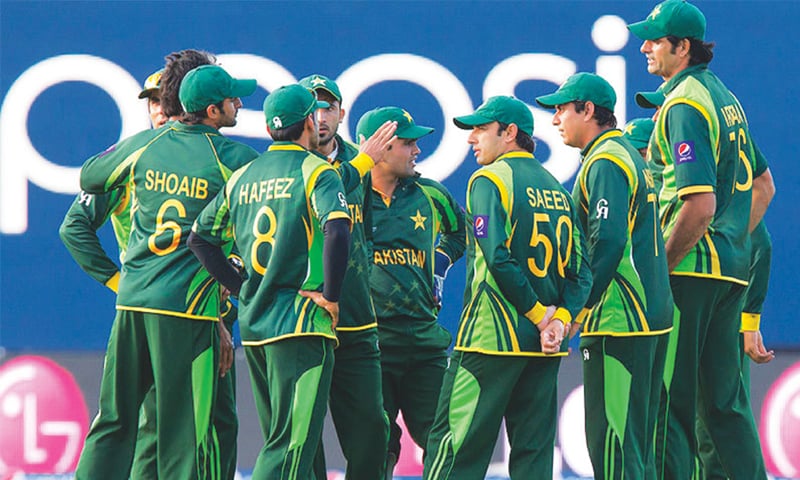One often hears about how the state of Pakistan’s cricket reflects the state of the country. The theory goes that the condition of the sport in the country and its team replicates the economic and political situation in Pakistan.
This theory is popular in other countries as well. For example, Brazil’s dismal performance in last year’s Football World Cup prompted many Brazilians to suggest that the economic woes being faced by the country and the rise of corruption in Brazil’s political institutions were reflected in the way the Brazilian football team performed in the mega event.
In 1974 when the Indian cricket team was battered by England (3-0) in a Test series, some Indian commentators suggested that the political upheaval being faced at the time by Prime Minister Indira Gandhi (over bad governance and corruption) had left the Indian society feeling agitated and cynical.
They suggested that it was this mind-set that was then also exhibited by the lethargic performance of the Indian cricket team on its disastrous tour of England that year.
In this respect, there are numerous examples involving various countries. But in the last decade or so, the way Pakistan’s economy and politics have suffered due to the rise of religious and sectarian violence, economic mismanagement, institutional corruption and a startling rise in crime, the Pakistan cricket team’s wildly unpredictable performances have often been described by many to be reflective of whatever bad that is going on in the country.
I am sure a lot of what goes wrong does rub off on how a country’s sporting culture takes its contemporary shape, but there is no hard and fast rule that this is always the case.
For example, in 1971 when Pakistan was being ripped apart by a vicious civil war in its eastern wing (former East Pakistan), the Pakistan hockey team actually went on to win hockey’s first ever World Cup (held in Barcelona, Spain).
If the West Indian and English teams turned political and economic turmoil into an inspiration on the cricket field, why can’t the Pakistanis?
When Pakistan was being harshly criticised for employing violent methods against separatists in East Pakistan, its hockey squad was pushed to play out of its skin to produce results that would contradict the negative perception of a country on the brink of a political and economic collapse and work as a balm for the people caught in the depression and agony of civil strife.
In the context of cricket, two most vivid examples come to mind in which teams from countries caught in political, social and economic chaos, actually used the predicament to inspire themselves to achieve something on the cricket field that was in stark contrast to what was happening in their respective countries.
In the 1970s, almost all of the island-states in the Caribbean that make up the West Indies (WI) cricket team were in the grip of radical political upheaval, so much so that some of the larger Islands were even on the brink of a revolution, as supporters of political parties often fought running battles against each other and the police.
The economy was suffering, the politics was shaky and society often faced rising incidents of crime and violence. This is when a batsman from Guyana, Clive Lloyd, was made the captain of the West Indies cricket team (1975).
But in the face of what was going on in the Islands, Lloyd’s team reacted in an opposite manner. The team negated the political disunity and turmoil on the Islands and replaced it with cricketing unity and a determination to change (through cricket) the perception of the Islands being shaky banana republics.
Turmoil on the Islands remained till the early 1980s, but from 1975 onwards, the West Indies cricket team began its climb to eventually become the number one Test and ODI side in the world, a status it would continue to enjoy throughout the decade.
And the irony is, the team’s performances actually began to decline when (in the 1990s), political stability began to return on the Islands and the economy started to exhibit healthy signs of improvement! It seemed the WI team had lost its purpose to display extraordinary feats of cricketing talent and achievements to the world.
Another cricket side saw itself rising as a cricketing power in the late 1970s. England had been a strong Test side but it had fallen on wayside in the mid-1970s.
However, it briefly toppled the WI and Australia as the world’s top two teams between 1977 and 1979 (under the captaincy of Mike Brearley who was considered to be more of an intellectual than a batsman!).
This happened when England was facing some of its worst post-War economic and political crises and race riots between West Indian and South Asian immigrants on the one side and White supremacists on the other.
As unemployment, strikes and riots were bringing England to a halt, the England cricket squad was emerging to become the world’s leading team.
This supremacy was lost after 1979, but when (even worse) race riots erupted again in 1981, Brearley (now in his 40s) was reappointed as captain after England lost the first Test of the 1981 Ashes series against Australia.
Brearley came in after the second Test of the six-Test-series, and as various cities in England (and Northern Ireland) burned, England went on to defeat a strong Australian side 3-1 (after being 1-0 down).
Like the WI, England’s captain had turned political and economic turmoil into an inspiration to do (on the cricket field) the opposite of what was happening on the streets.
Published in Dawn, Sunday Magazine, March 8th, 2015
On a mobile phone? Get the Dawn Mobile App: Apple Store | Google Play












































